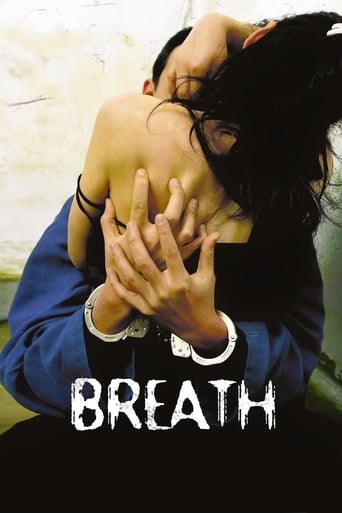ada
the leading man is my tpye
Exoticalot
People are voting emotionally.
Phonearl
Good start, but then it gets ruined
CrawlerChunky
In truth, there is barely enough story here to make a film.
clg238
In the old silent movies, captions were needed even as the actors did their best to convey emotions, often (by today's standards) way overdoing it. The actors in "Breath" skillfully convey practically all we need to know about what is going on in their internal lives, without dialogue. There is, in fact dialogue--not a lot, just exactly enough. This is a daring and brilliant film, and, sorry to say, one that doesn't seem to appeal to many people. I find the film quite transparent, but reviewers seem stymied by the odd situation (a woman in a broken marriage goes to visit a stranger on death row to offer him comfort). What is so difficult about this? She feels as if she is dying so she reaches out to someone else who is dying, even before his sentence is carried out. DUH. How she reaches out is quirky; not for a moment did my attention flag. The relationship motif is enhanced by what transpires in the prison cell of the condemned man, which he shares with three other men, one of whom is in love with him. This is not a film for those who want everything laid out for them so that they don't have to participate in elucidating the meaning. However, for those who are willing to put together the few pieces of the puzzle in this spare and gorgeous film, the effort will be rewarding. I found the film deeply touching, painful, beautiful, and haunting.
Onderhond
It's no secret that I have little affection with Korean cinema. It's just not my cup of tea. But among the rubble of popular Korean cinema there's a true cineast pumping out brilliant cinema at a dazzling rate. Kim Ki-duk is a regular art-house favorite and rightfully so. This weekend I had the pleasure of watching his latest effort on the big screen. screen cap from breathSo far, I've seen all of Ki-duk's films. Over the years he's made little changes to his success formula, only visually his films have become a lot more mature. Breath continues this tradition, ignoring the little misstep of his previous film Shi Gan. Ki-duk reaches back to his "quiet cinema" and with success.Breath has it all. Troubled characters, little dialog, rough around the edges and strange happenings. But underneath that barren surface lies a more subtle, warm interior. Not exactly new, but it's the first time Ki-duk plays with this emotion so openly and the change of heart is notable throughout the film.At its core, Breath tells the story of four broken characters. No director that is more able to create a setup where unlikeable characters can win the sympathy of an audience. Because not a single one of the characters in Breath is free from sin. The prisoner killed his wife and kid, his fellow prisoner hurts him because he can't express his love, the mother cheats on her husband with the prisoner and the husband mistreats his own wife and has a flirt on the side. And thus starts a story of a love between four people.Ki-duk brings his characters alive with rather unknown actor, though they are really some of the best modern Asian cinema has to offer. Especially Chen Chang bring a lot to this film, adding yet another strong film to his impressive list of acting jobs. Chang's wife is also very strong in her role, hardly speaking but playing her emotions instead of telling them. Class-A stuff. screen cap from breathVisually, Ki-duk is still improving with each film. While his earlier films were too unfinished to be considered visually impressive, his newer work has this delicate touch that enters every shot. Ki-duk's timing is also improving, and his eye for interesting compositions is still functioning rather well. The film is never absolutely stunning but the quiet, subtle images bear well with the rest. He matches his visuals with a soundtrack that enhances this delicate feeling.As an interesting surprise, Ki-duk inserts several musical intermezzos. He also revives his seasonal structure and couples a song to each season. The happy mood coming from those scenes is in sharp contrast with the actual feelings of the characters. A nice addition that reliefs, but at the same time hurts just as much.I guess Breath is a little more playful than his previous films overall. There's of course Ki-duk himself playing director behind his screen in prison. It's an interesting extra layer that made me smile when I noticed it. And it leads to a strong scene where he cuts from the love scene in prison to the father and kid playing outside in the snow. I also liked the "acted" musical intermezzos, which add a second level of acting. Beautiful scenes with very contrasting feelings.Breath is a strong entry in Ki-duk's ever growing list of films, positioning itself among his best work. While progress between his films is slow and his work hardly brings anything new to the table, his unique position in the world of cinema makes this of little importance. He keeps improving himself and Breath illustrates this well. Awesome film, not really my preferred kind of cinema and because of that all the better for making me love this film and its characters. 4.5*/5.0*
Harry T. Yung
In commenting on Kim's (that is his surname) movies, I am aware of my limitation of not having seen "Spring, summer, fall, winter….and spring" (2003) which purported is his best film. "Samaria" (2004) I really like, seeing it as a depiction of polarization (in more ways than one) as well as a touching father-and-daughter story. "Bin-jip" (2004), unfortunately, I cannot bring myself to join the general chorus to praise. If found it unconvincing and shallow, "4 clever ideas adding up to a prank" as I put in my summary line."Breath" (or "Soom") I found to be a distant cousin of "Bin-jip" although more serious and less haphazard. Like any of Kim's movies, "Breath" has things enigmatic that seem to require explanation. But Kim is a director that had openly declared that he won't bother explaining his movies. Indeed, explanations are not even required.Shot with imaginative camera work and Kim's usual attention to details, this movie tells the story of how a woman whose marriage is on the rocks starts visiting a prisoner on death roll and gradually develops a subtle relationship with him. Her family life is however not entirely unbearable. Although it is unfortunate that her husband has an affair, he is not depicted as a particularly despicable character. He genuinely cares about their pre-teen daughter and reacts with restrained sense when he discovers his wife's strange routine. He even drives her to the prison on her final visit.The prisoner's story is grimmer. We are told that he is on death roll for murdering his own wife and children. He hardly ever speaks, his lifeless eyes seem always indicate a trance and his attempted suicide has led to advancing of his execution date. One of the three prisoners in the same cell, a young man (who doesn't speak either), harbors homosexual desires for him and becomes obviously jealous as the situation progresses.The audience, depending on the POV they place themselves, can see many different things in this movie: a threatened marriage salvaged by some bazaar action, absolution and reconciliation, unpredictable ways a relationship between two individuals can develop, mental anguish of a prisoner on death roll, absurdities in a prison cell – these are among the more obvious. Talking about POV, it is interesting to note that the key scenes that take place in the visiting cell are seen through the eyes of the security officer who monitors the close-circuit TV in the prison. We only see this character as a refection on the monitor. As director Kim's name in on the IMDb cast credit, I wonder if he is the one who plays this security officer. If it is indeed the case, is he consciously doing the M. Night Shyamalan thing?
Chris_Docker
In Dancer in The Dark, Lars von Trier told the story of a girl who could create such a vivid interior life that it could soar over any misfortune, even death. In Breath, Director Ki-duk Kim tells the story of a girl who tries to transfer a similarly strong vision to a condemned man on death row.What do you do to raise your spirits? Listen to a song? Walk through the countryside? Go on holiday somewhere nice? Take any of these things, and they are heightened if love and desire are added.When I was seventeen, I used to walk five miles every night. Just to hold my sweetheart's hand and kiss her goodnight. Even in winter, I felt as if I were walking on air. Sounds kinda stupid, looking back. Especially as it didn't last. But those miles disappeared in seconds.Breath opens unremarkably. Jang Jin is on death row and attempts suicide by sharpening a toothbrush and stabbing himself with it. (He's played by Chen Chang, the sexy outlaw suitor to Zhang Ziyi in Crouching Tiger, Hidden Dragon.) The incident makes the evening TV news.Yeon's husband is having an affair. He tells her to get out and meet people instead of staying at home making sculptures. On an impulse, she goes to visit Jang Jin. On a subsequent visit, she decorates the visiting room with blown-up pictures of spring, fills the area with artificial flowers, and sings to him. She wears a summer dress even though it is mid-winter. Yeon's poetry of life has a profound effect on Jang Jin. They fall passionately in love. But trouble brews from Jang Jin's jealous cellmates and Yeon's violent husband.When Breath started, I admit I found it less than engaging. But suddenly these scenes that Yeon constructs for Jang Jin explode with a powerful emotional force. Have you ever been on one of those simulator machines where you step in and it starts moving about, replicating sensations that match the screen in front of you? It's that sudden. One second you are watching an ordinary prison drama, interspersed with inconsequential domestic stuff. Then Wham! You are suddenly catapulted, knocked sideways, jolted out of your seat. And that, of course, is a pale reflection of the effect we realise it must be having on Jang Jin. We start living for these intense (yet emotionally draining) moments in the film, just as Jang Jin does.Throughout precisely architectured cinematography, Ki-duk Kim weaves a poetry of life and death. "We are already crazy inmates on death row. Until we can breathe no more." Contrasts between the two protagonists' lives outside the meeting room and what goes on inside are mirrored in verbal contrasts where one person will speak and the other stays mute. Breathing in and breathing out. Locked in a passionate kiss. Or holding one's breath underwater.Breath also has a bitter edge. Is she preparing him for the moment when he takes his last breath? (South Korea is one of the very few fully developed democracies where the death penalty is still allowed.) Don't expect any nice redemptive ending. Like Dancer in The Dark, Breath mostly gets darker. "Even though I call with sorrow, Only the white snow falls." It may also be too laboured – even artificial – for some audiences.Breath is an icy, chilling love story. It looks at a bond that goes beyond the simplicities of life and death. And it's as finely chiselled as a piece of sculpture. Some scenes contain a rare combination of animal intensity and poetic tenderness. The whole unfolds as a dazzling testament to the artistry of Ki-duk Kim.

